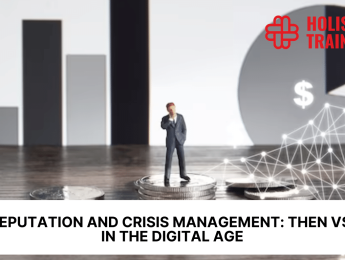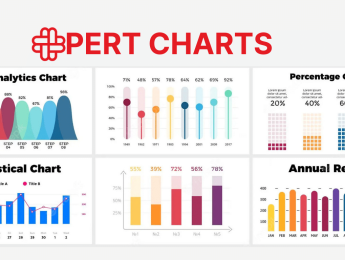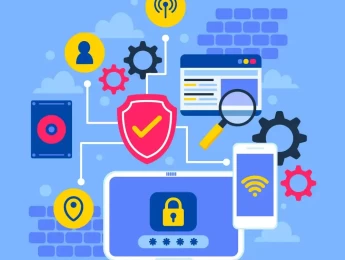- Table of Contents
- Reputation and Crisis Management: Then vs. In the Digital Age
- How Can Social Media Be Detrimental to Your Company’s Reputation?
- The Benefits of a Reputation and Crisis Management Plan
- Preventing Reputation Erosion
- Preserving Customer Trust
- Staying Ahead of the Narrative
- Fostering Positive Relationships
- Differentiating from Competitors
- Enhancing Employee Morale
- Mitigating Financial Impact
- Building Resilience
- Improving Long-Term Strategy
- Creating a Positive Feedback Loop
- Establishing Reputation Management Alerts
- 1. Real-Time Awareness
- 2. Staying Ahead of Potential Issues
- 3. Tools for Reputation Management
- 4. Swift Engagement with Customers
- 5. Managing Potential PR Crises
- 6. Proactive Approach to Online Reputation
- 7. Building a Positive Online Reputation
- 8. Data-Driven Decision Making
- 10 Practical Tips for Successful Crisis Management
- 1. Develop a Crisis Communication Team:
- 2. Anticipate Potential Scenarios:
- 3. Create a Clear Communication Protocol:
- 4. Craft Consistent Messages:
- 5. Act Swiftly and Transparently:
- 6. Monitor Social Media:
- 7. Leverage Influencers and Advocates:
- 8. Apologise and Make Amends:
- 9. Learn and Improve:
- 10. Continuously Update Your Plan:
- How to Create a Robust Business Continuity Plan
- 1. Identify Critical Functions:
- 2. Assess Risks:
- 3. Develop Response Strategies:
- 4. Implement Backup Solutions:
- 5. Train Your Team:
- 6. Establish Communication Protocols:
- 7. Review and Update:
- In Conclusion
Introduction
The modern business arena is a digital battleground, where the echoes of customer opinions, both positive and negative, reverberate across vast online landscapes. In this era of interconnectedness, reputation management and crisis response have transcended mere strategies to become the heart of maintaining a thriving brand. The rise of social media platforms and the instantaneous spread of information have transformed these practices into essential pillars of any successful business venture. In the following discourse, we will explore the intricate world of reputation and crisis management in the digital age, delving into the perilous pitfalls of social media, the invaluable benefits of a comprehensive management plan, and offering a treasury of ten actionable tips for steering through the tempestuous waters of crisis management.
Reputation and Crisis Management: Then vs. In the Digital Age
Gone are the days when reputation management was predominantly a face-to-face affair, relying on word-of-mouth recommendations and traditional media coverage. The advent of the digital age has revolutionised the way businesses interact with their audience. The amplification of information through social media and online reviews has transformed the reputation landscape into a fast-paced, globally accessible arena.
In the past, negative incidents might have had limited reach and took time to garner attention. Now, a single tweet, post, or review can instantly go viral, potentially causing irreparable damage to a company's reputation. Conversely, businesses that skillfully leverage digital platforms can cultivate a strong and positive online presence that resonates with their target audience.
Table 1: Reputation and crisis management: then vs. now
Aspect | Then | Now |
Communication | Face-to-face, limited | Instant, global, social media-driven |
Speed of Spread | Slow, limited reach | Instant, viral potential |
Audience Reach | Local/niche | Global, diverse, vast reach |
Amplification | Word-of-mouth, limited | Social media, online reviews, vast |
Response Time | Days or weeks | Immediate, real-time responses |
Impact Potential | Limited, gradual | Severe, rapid, potentially global |
Brand Visibility | Local or regional | Global, accessible to all online |
How Can Social Media Be Detrimental to Your Company’s Reputation?
Social media, while a powerful tool for brand building and customer engagement, can also act as a double-edged sword. One misstep can quickly escalate into a full-blown crisis. Negative comments or customer complaints can spread like wildfire, tarnishing your reputation in a matter of hours.
One of the biggest challenges with social media is the lack of control over the narrative. False information or misconstrued messages can rapidly gain traction, necessitating swift and effective crisis management to prevent further damage. Therefore, businesses must proactively monitor their online presence and be prepared to respond promptly to any issues that arise.
Not only that, but also a large number of people rely on social media or the internet in general to research products and brands. In fact, according to ThriveMyWay, 75% of customers say that they will trust a company if there are positive reviews of it online. So, if you’ve got a bad online reputation, you will most likely lose potential customers.
The Benefits of a Reputation and Crisis Management Plan
In the digital age, a strong online reputation is not just a nice-to-have; it's an absolute necessity for long-term success. A well-executed reputation and crisis management plan offers a multitude of benefits that extend far beyond the resolution of immediate issues. Let's delve deeper into these advantages:
Preventing Reputation Erosion
Proactive reputation management involves continuous monitoring of online platforms and social media channels. By employing advanced analytics tools, businesses can identify emerging negative trends, enabling them to respond swiftly. Addressing concerns privately and publicly showcases the brand's commitment to customer satisfaction, effectively curbing potential escalation.
Preserving Customer Trust
In addition to transparency, a robust reputation management plan involves actively seeking customer feedback. By demonstrating a willingness to listen and improve based on customer opinions, businesses not only preserve trust but also strengthen it. Trust fosters customer loyalty, leading to repeat business and positive referrals, further enhancing the brand's reputation.
Staying Ahead of the Narrative
During crises, immediate response is crucial. A well-prepared crisis management plan includes pre-drafted responses for various scenarios. By swiftly addressing issues, acknowledging mistakes, and outlining corrective actions, a business can regain control of the narrative. This proactive approach ensures that the story being told aligns with the organization's values, mitigating reputational damage.
Fostering Positive Relationships
Effective reputation management involves active engagement on social media and other platforms. Acknowledging positive feedback publicly and addressing negative feedback privately showcases a brand's commitment to customer satisfaction. Engaging in conversations beyond sales, such as supporting community initiatives or addressing social issues, further fosters positive relationships, building a loyal customer base.
Differentiating from Competitors
A positive online reputation not only attracts customers but also attracts top talent. Potential employees often research a company's reputation before applying. By showcasing a strong positive image, a business can attract skilled professionals who want to be associated with a respected and reliable organization, giving the company an edge over competitors.
Enhancing Employee Morale
Employees take pride in working for a reputable company. A reputation management plan that highlights ethical practices, corporate social responsibility, and positive customer interactions instills pride in employees. This pride translates into higher morale, increased productivity, and a willingness to go above and beyond, creating a positive internal culture.
Mitigating Financial Impact
The financial repercussions of a damaged reputation are not just immediate; they can have long-term effects. Loss of customers, decreased sales, and diminished investor confidence can severely impact revenue. A proactive reputation management plan, coupled with a crisis response strategy, helps in minimizing these financial losses by ensuring that the brand's image remains intact.
Building Resilience
Through regular training and simulation exercises, employees become adept at handling various crisis scenarios. This preparedness not only ensures effective crisis management but also instills a sense of confidence and calm during turbulent times. A resilient organization can weather storms more effectively, emerging stronger on the other side.
Improving Long-Term Strategy
Data collected from reputation management activities is invaluable. By analyzing sentiment trends, businesses can gain insights into customer preferences, market perception, and areas of improvement. This data-driven approach aids in shaping long-term strategies, helping the business stay ahead of market trends and evolving consumer demands.
Creating a Positive Feedback Loop
By actively engaging with your audience, responding to feedback, and showcasing improvements based on customer input, you create a positive feedback loop. This loop of trust and engagement can lead to improved customer retention and advocacy.
In essence, a reputation and crisis management plan is an investment in the future of your business. It's a testament to your commitment to excellence, your willingness to learn from mistakes, and your dedication to nurturing positive relationships in the digital world.
Establishing Reputation Management Alerts
In today's digital landscape, where information travels at the speed of light, being aware of how your brand is perceived online is paramount. Setting up reputation management alerts is a proactive strategy that empowers businesses to effectively monitor their online presence. Here's why:
1. Real-Time Awareness
Online reputation management alerts provide real-time updates about brand mentions across various online platforms. Whether it's social media, news articles, blogs, or reviews, these alerts ensure that you are promptly informed about any discussions related to your brand.
2. Staying Ahead of Potential Issues
By receiving immediate notifications, businesses can stay ahead of potential issues. Whether it's a negative review gaining traction or a customer complaint going viral, being aware allows for swift response. Addressing problems at their inception prevents them from snowballing into major reputation crises.
3. Tools for Reputation Management
Utilising a variety of tools such as Google Alerts, social media monitoring software like Hootsuite or Sprout Social, and advanced sentiment analysis tools, businesses can gain valuable insights. These tools not only track brand mentions but also assess the sentiment behind these mentions, helping companies understand public perception.
4. Swift Engagement with Customers
Positive comments and feedback deserve acknowledgment. Reputation alerts enable businesses to promptly thank customers for their positive reviews, fostering goodwill. This engagement strengthens customer relationships, leading to increased brand loyalty and positive word-of-mouth.
5. Managing Potential PR Crises
In the event of negative mentions or PR crises, a timely response is critical. Reputation management alerts allow businesses to identify such situations as soon as they arise. By addressing complaints, clarifying misunderstandings, or issuing apologies promptly, brands can manage and mitigate the impact of potential crises.
6. Proactive Approach to Online Reputation
A proactive stance is key in the digital landscape. Reputation alerts facilitate a proactive approach, allowing businesses to anticipate issues before they escalate. This proactive management demonstrates to customers and stakeholders that the brand is attentive, responsive, and committed to customer satisfaction.
7. Building a Positive Online Reputation
By consistently engaging with customers, addressing concerns, and managing PR incidents effectively, businesses can build and maintain a positive online reputation. Positive interactions, especially in the public domain, contribute to shaping a favorable perception of the brand, attracting more customers and enhancing trust.
8. Data-Driven Decision Making
The data collected through reputation management alerts can be analysed to gain deeper insights. Understanding patterns and trends in brand mentions and customer sentiment provides valuable data for strategic decision-making. Businesses can refine their products, services, and communication strategies based on this feedback, ultimately improving the overall customer experience.
In summary, establishing reputation management alerts is a proactive and strategic approach that forms the foundation of effective online reputation management. By leveraging these tools, businesses can navigate the digital landscape with confidence, ensuring they are not just reactive but actively shaping and enhancing their online reputation. This continuous effort fosters positive relationships, boosts brand credibility, and contributes significantly to long-term success in the digital age.
10 Practical Tips for Successful Crisis Management
Navigating a crisis in the digital age requires a strategic and agile approach. A well-prepared crisis management plan can mean the difference between a minor setback and a full-blown reputation disaster. Here are ten practical tips to guide you through successful crisis management:
1. Develop a Crisis Communication Team:
Assemble a dedicated crisis management team comprising individuals from various departments. Each member should have specific roles and responsibilities, forming the first line of defense during a crisis. This team coordinates efforts, handles internal and external communication, and ensures a unified response.
2. Anticipate Potential Scenarios:
Conduct brainstorming sessions to identify potential crisis scenarios. From product recalls to social media backlash, anticipating these situations allows for the development of tailored response strategies. Preparedness is key to responding swiftly and effectively.
3. Create a Clear Communication Protocol:
Establish a well-defined communication protocol outlining decision-making responsibilities, media interaction, and statement approval processes. Clarity in roles ensures a streamlined response. Having a structured chain of command empowers team members to act decisively.
4. Craft Consistent Messages:
Develop key messages aligned with your brand's values and tone. These messages should be adaptable to different situations while maintaining a consistent brand voice. Consistency across communication channels reinforces your brand's credibility and stability.
5. Act Swiftly and Transparently:
Timely response is crucial. Silence in the face of a crisis is not an option. Acknowledge the situation promptly and provide regular updates as new information arises. Transparency, even when the complete picture isn't clear, demonstrates authenticity and maintains trust.
6. Monitor Social Media:
Social media platforms often amplify crises. Utilize social media monitoring tools to track mentions, comments, and sentiment shifts related to your brand. Engage with customers, address concerns, and counter misinformation promptly. Active social media management can mitigate reputational damage.
7. Leverage Influencers and Advocates:
Identify influencers and brand advocates who genuinely support your business. Positive endorsements from these voices can counteract negative sentiment. Leveraging their support during a crisis adds credibility to your messages and reassures your audience.
8. Apologise and Make Amends:
If your company is at fault, a sincere apology is essential. Acknowledge the issue, take responsibility, and outline steps for resolution. Demonstrating accountability and a commitment to rectifying the situation rebuilds trust and showcases your brand's integrity.
9. Learn and Improve:
Post-crisis, conduct a thorough analysis of the incident and your response. Identify what worked well and areas for improvement. Use these insights to refine your crisis management plan, making it more robust. Learning from past experiences strengthens your preparedness for future crises.
10. Continuously Update Your Plan:
According toPR News, while 62% of businesses have crisis plans in place, a minority regularly update these plans or engage in scenario practice. The digital landscape evolves, and so do potential crises. That’s why you need to regularly review and update your crisis management plan to ensure its relevance. Conduct training sessions and mock crisis simulations to keep your team prepared and adaptive. Proactive planning ensures you're ready to face any challenges that arise.
Remember, crisis management is not just about damage control; it's an opportunity to showcase your brand's values, empathy, and resilience. By approaching crises with a proactive mindset and a well-prepared plan, you can turn challenging situations into opportunities to strengthen customer relationships and emerge from the storm with your reputation intact.
Table 2: Reputation and crisis management plan
How to Create a Robust Business Continuity Plan
A robust Business Continuity Plan (BCP) is the backbone of any organization's resilience. It not only safeguards essential functions during crises but also plays a pivotal role in maintaining the company's reputation and customer trust. Here's a detailed breakdown of how to create an effective BCP:
1. Identify Critical Functions:
Begin by identifying and prioritizing your core business functions. These are the operations that are fundamental to your company's survival, such as sales, customer service, and supply chain management. Prioritize these functions based on their impact on revenue and customer satisfaction. Understanding what is essential helps in focusing resources and efforts effectively.
2. Assess Risks:
Conduct a comprehensive risk assessment. Identify potential threats such as natural disasters, cyberattacks, pandemics, supply chain disruptions, and more. Evaluate the likelihood of these risks occurring and assess their potential impact on your business operations. Understanding your vulnerabilities is key to developing effective response strategies.
3. Develop Response Strategies:
For each identified risk, create detailed response strategies. Specify clear steps to mitigate the impact, assign responsibilities to key personnel, and establish communication protocols. Having a well-defined action plan ensures a coordinated response during a crisis, minimizing confusion and enabling quick decision-making.
4. Implement Backup Solutions:
Ensure that your critical data, applications, and systems are regularly backed up. Implement robust backup solutions to minimize data loss in case of a crisis. Cloud-based storage and off-site backups provide additional security layers. Regularly test the backup and recovery procedures to ensure they are functional and reliable.
5. Train Your Team:
Educate your employees about the BCP and their roles and responsibilities during a crisis. Conduct regular training sessions and drills to familiarise the team with emergency procedures. Simulated exercises can help identify gaps in the plan and provide opportunities for improvement. Well-trained employees respond more effectively during high-stress situations.
6. Establish Communication Protocols:
Develop a clear and efficient communication plan. Define how internal and external communications will be managed during a crisis. Establish primary and alternative communication channels. Ensure that employees, customers, suppliers, and other stakeholders are informed promptly and accurately. Transparent communication fosters trust and confidence.
7. Review and Update:
A BCP is not a static document; it needs to evolve with your business and the changing risk landscape. Regularly review and update the plan to incorporate lessons learned from past incidents and to address emerging threats. Reassess your critical functions, risks, and response strategies periodically. Keeping the plan current ensures its effectiveness and relevance.
In short, a well-structured Business Continuity Plan is vital for ensuring business stability, safeguarding your reputation, and maintaining customer trust. By identifying critical functions, assessing risks, developing clear response strategies, implementing backup solutions, training your team, establishing communication protocols, and regularly reviewing the plan, your organization can navigate crises with resilience and confidence, emerging stronger on the other side.
In Conclusion
Navigating the digital world requires a proactive approach to reputation and crisis management. Social media's power to both build and damage reputations necessitates a carefully crafted strategy and a rapid response plan. By anticipating potential crises, crafting consistent messages, and learning from each situation, businesses can effectively weather storms and emerge stronger than before. Remember, a robust reputation management plan coupled with a comprehensive business continuity plan can be the lifeline that keeps your business thriving, even in the face of adversity.
If you're looking to delve deeper into the realm of effective online presence and engagement, consider enrolling in our comprehensive course: ‘Social Media 101 for Businesses.’ This course will equip you with the tools and strategies needed to harness the power of social media for enhancing your brand's reputation and navigating crises with confidence. Your brand's digital destiny awaits – take the next step today.























